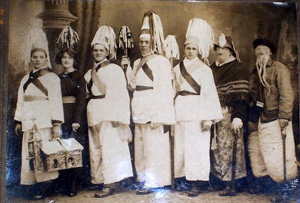News & announcements
Saving your history
Early accounts
Maps
Nearby towns
People
Churches
Schools
Municipal
Organizations
Businesses
The mines
Transportation
Streets
Buildings
Entertainment
Celebrations
Sports
Ethnic groups
St. Mary's Byzantine Catholic Church - Christmas Gubi tradition
Gubi from St. Mary's Church, ca. 1929
This photo comes to us courtesy of Ann Malenky Nakpairat. Ann
wrote: I believe [this photo] is a
group of Gubi from St Mary's
church in Freeland, who went out before Christmas singing carols and
were scary as all get out to kids. It was my grandfather's. I remember
it being at the farm ever since I can remember. Whether I ever saw
these Gubi, I don't know; however, I do remember much talk about them
and how scary they were. I also recall hiding the picture in a trunk.
Sometimes lore takes on a life of its own. The first one is carrying a
church model with, they say, a nativity set in it. Born in 1855, I
doubt that my grandfather was a caroler nor my father. No one in our
family can sing a note. I do not know the identity of any of them. They
would have to be from St. Mary's as we celebrated both Christmases in
our family.
Ann
wrote: I believe [this photo] is a
group of Gubi from St Mary's
church in Freeland, who went out before Christmas singing carols and
were scary as all get out to kids. It was my grandfather's. I remember
it being at the farm ever since I can remember. Whether I ever saw
these Gubi, I don't know; however, I do remember much talk about them
and how scary they were. I also recall hiding the picture in a trunk.
Sometimes lore takes on a life of its own. The first one is carrying a
church model with, they say, a nativity set in it. Born in 1855, I
doubt that my grandfather was a caroler nor my father. No one in our
family can sing a note. I do not know the identity of any of them. They
would have to be from St. Mary's as we celebrated both Christmases in
our family. Ann guessed that this photo might date from around 1929. Charlie Reczkowski also shared with me a recollection of a group that he called the Kuby Bace (pronounced "Koobee Botchee") from around 1930, who caroled in the Slovak, Polish and Greek Catholic parishes in Freeland at Christmas. The carolers included a Santa and several angels in white clothes with red and blue ribbons criss-crossing their chests. They would go from house to house, and would donate to the churches part of the money they received for their singing. As I look at this photo, I can see that it would have been the two individuals in masks on the right who would have been in charge of scaring kids. Notice also the sticks they carried.
Please show this photo to your older family members and see if they remember anything like these Gubi (that's the plural, and singular form is Guba or Kuba). If anyone reading this page knows of other people who participated in this tradition, I would love to hear about it. Additional photos would also be very welcome. I know that something like this tradition is still practiced in parts of Slovakia, and I don't know whether it is still done in other countries in eastern Europe. However, this is a tradition that has surely all but faded from our American experience.